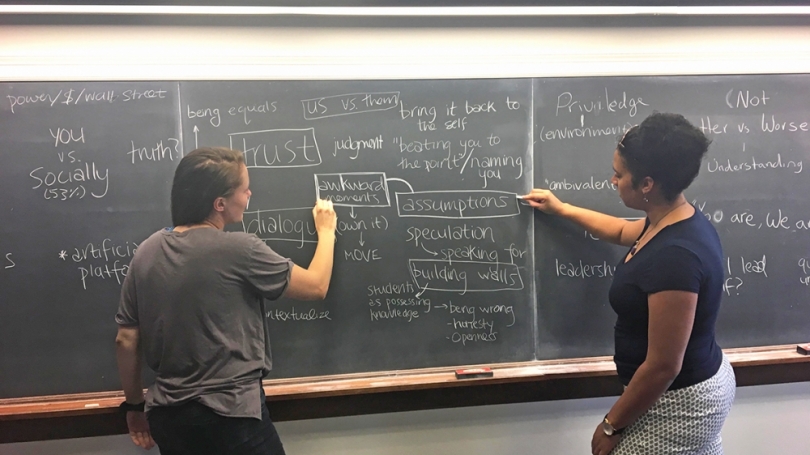
- Undergraduate
- Foreign Study
- Research
- News & Events
- People
Back to Top Nav
Back to Top Nav
Back to Top Nav
From: The Dartmouth (http://www.thedartmouth.com/article/2017/09/jake-maguire-telling-story-for-social-change)
At a time when American society seems to be splintering along ever-widening cultural fissures over issues that range from immigration to football, a course at Dartmouth is striving to bridge the socioeconomic divide between Dartmouth students and members of the Upper Valley community.
In English 53.04, “Telling Stories For Social Change,” which is offered each fall and cross-listed with the women’s, gender, and sexuality studies department, Dartmouth students meet weekly with female clients at Valley Vista, a substance abuse rehabilitation center in Bradford, Vermont, to share their stories with one another. The students also read and discuss relevant articles and literary works about poverty, incarceration, drug addiction and the challenges associated with recovering from substance abuse.
English professor Ivy Schweitzer and women’s, gender and sexuality studies professor Pati Hernández co-teach the course at Dartmouth. They first met in the late 1990s, and began volunteering together at women’s prisons in 2005. Two years later, in 2007, Schweitzer and Hernández began offering a course for Dartmouth students that evolved into the course in its current form.
Hernández, who prefers to be called “Pati” rather than “Professor Hernández” in order to establish a sense of neutrality with her students and the patients at Valley Vista, teaches the course because she wants Dartmouth students to understand and accept people who may initially appear to be different from them.
“I like to give students an idea of openness, and I want them to embrace an experience that makes them feel vulnerable,” Hernández said. “I like to expose students to the [concepts] of halting judgment, not making assumptions,and not having expectations.”
Similarly, Schweitzer encourages her students and the patients at Valley Vista to learn from one another.
“We’re all students, and we’re all teachers,” Schweitzer said.
She emphasized that humility, along with “love, faith, trust, hope, critical thinking and radical curiosity,” can help to facilitate meaningful relationships despite differences in class or social status.
However, due to “preconceived notions and initial judgments on both sides,” students and patients have initially struggled to bond with one another in the past.
Adrianne Pelton, a self-described recovering alcoholic and former Valley Vista patient, had a similar experience during her first meeting with the Dartmouth students last year.
“My experience with the students coming in [involved] a lot of judgment,” Pelton said. “I was judging everyone else in my facility, and I wanted to differentiate myself from them, in order to feel like I wasn’t an addict. Also, I remember hearing what the other patients were saying before the Dartmouth students got there … There was a lot of anger initially.”
However, Pelton eventually found the sessions with the Dartmouth students to be meaningful and constructive. She stayed in touch with Hernández after the program ended and now helps to facilitate the class discussions and meetings with the clients at Valley Vista.
“I felt like there was something I could do,” Pelton said. “I wanted to get involved.”
Hernández is optimistic that the Dartmouth students and the patients at Valley Vista will grow closer over the remainder of the term.
“The experience itself is really challenging, motivating and a source of inspiration to both parties,” Hernández said. “It often leads to collaboration between groups, and I am grateful for that.”